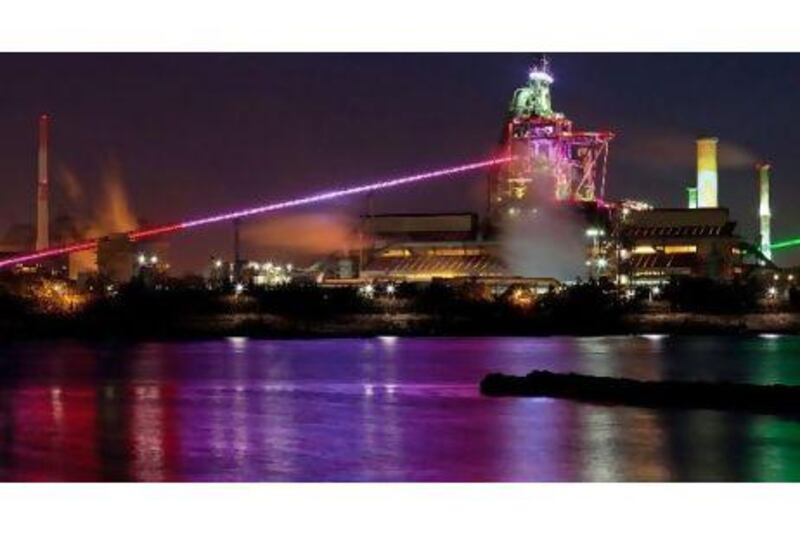After six years of arduous bureaucratic struggles and political wrangling, a major project finally took off last week.
The South Korean steel major Posco signed a memorandum of understanding in 2005 to build a 510 billion rupee (Dh41.93bn) steel mill in the eastern state of Orissa. It was the biggest foreign direct investment in India's history.
But Posco's path to India was far from smooth: it faced regulatory hurdles from the government; came under fire from human rights activists for human displacement at the mill site; and faced violent protests by indigenous tribes in Orissa who accused the company of trying to usurp their land.
But the biggest opposition came from an unexpected source: the Indian environment ministry led by a feisty technocrat-turned-politician who has acquired the image of "Dr No" in corporate circles.
Jairam Ramesh, the Indian environment minister, has won worldwide acclaim for raising the nation's profile in fighting climate change, but his passionate enforcement of rules has delayed several key industrial projects in recent years.
The ministry maintained a modest profile under his predecessors. Getting its nod, a mandatory requirement for all industrial projects, was seldom considered an obstacle.
But Mr Ramesh's pen has often wavered over the dotted line in his brief but eventful tenure, sealing the fate of several multibillion-rupee projects.
He has rejected plans by the British resources giant Vedanta to mine bauxite on land held sacred by indigenous tribes, ordered the demolition of a swanky Mumbai tower that violated shoreline protection rules, and stalled construction of a Mediterranean-themed luxury enclave near Mumbai.
The approval for Posco came after a detailed "technical evaluation of the project", Mr Ramesh said. It paved the way for a steel mill on 1,253 hectares of forest land and eased diplomatic tensions with South Korea, which is one of India's closest trading partners.
But it came with riders including a mandate for Posco to establish an equal amount of forest area in another part of Orissa. It was the "greenest of green" approvals, the minister said.
"I believe as a minister my responsibility is not just to do the right thing, but to do the thing right," Mr Ramesh said.
He also granted conditional approval to two other major projects this year - an international airport large enough to handle 60 million passengers a year to be built outside of Mumbai, and a 1 trillion rupee nuclear power project on the Konkan coast in western India.
But Mr Ramesh has halted several big-ticket projects. Last August he refused to approve the US$1.7bn (Dh6.24bn) project by Vedanta to mine around a mountain sacred to the Dongria Kondh tribe in eastern India.
The clan, dubbed the "Avatar tribe" after the subjects of the Hollywood blockbuster, say their existence is imperilled by the project.
Mining operations, tribe members said, threatened not only their worship of Niyam Raja, but also rare flora and fauna including the golden gecko and the four-horned antelope.
Mr Ramesh's decision to reject the proposal jeopardised the company's plans for an $8bn expansion of its 1 million-tonne aluminium refinery in the region.
"This is not an emotional decision," he said at the time. "There is no prejudice and no politics. This is not because [these hills] are sacred. This is purely a legal approach.
"There has been a very serious violation of environment protection act, forest conservation act and the forest rights act."
In November, Mr Ramesh halted the construction of Lavasa, a $31bn township comprising waterfront bungalows, hotels, restaurants and technology parks on about 9,300 hectares of rugged hills surrounding a dam's backwaters in western India.
He said the project was illegal because its builder, Hindustan Construction, had not sought approval from New Delhi and was responsible for causing environmental damage in the region. He asked for the project to be razed.
Ajit Gulabchand, the chairman of Hindustan Construction, challenged Mr Ramesh's decision in a court that later ordered an inspection of the project.
Mr Gulabchand says his company, which has 17bn rupees of debt, is losing 50 million rupees every day because of delays in construction.
He says his company's $440m initial public offering has had to be postponed indefinitely because of the continuing tussle with Mr Ramesh.
About 70 per cent of planned infrastructure projects in India face inordinate delays due to issues related to the acquisition of land or environmental clearances, according to a report titled "India infrastructure - Paving the Way for India's growth", released in April last year by Ernst & Young and the Federation of Indian Chambers of Commerce and Industry (Ficci).
The Associated Chambers of Commerce and Industry of India estimates such issues threaten to endanger investments worth $150bn.
But Mr Ramesh is loved as much as he is loathed.
He is lauded by some for taking positions normally assumed by activists. He is praised for being transparent and accessible, unlike his government colleagues, and for going out of his way to consult experts and activists.
Last year, Mr Ramesh was voted person of the year by the Indian edition of Forbes magazine. He was ranked 12th on The Indian Express list of India's most powerful, competing with the likes of Rahul Gandhi, the heir apparent of the ruling Congress party.
Local media have described him as India's "first independent thinking environment minister".
Ramachandra Guha, a well-known historian and writer, called him a "true environment minister".
"Intellectually speaking, the present incumbent Jairam Ramesh is a considerable improvement on all others who have held this post since 1980," Mr Guha says.
Amit Mitra, the secretary general of the Ficci, says Mr Ramesh is commendably discovering a "fine balance" between protecting the environment and promoting industrial development.
"However, the minister shouldn't impose conditions that bring death to a project," Mr Mitra warns.
"Around 3 million young people who join the work force every year don't have any jobs. Without industry, how will they find employment?"





